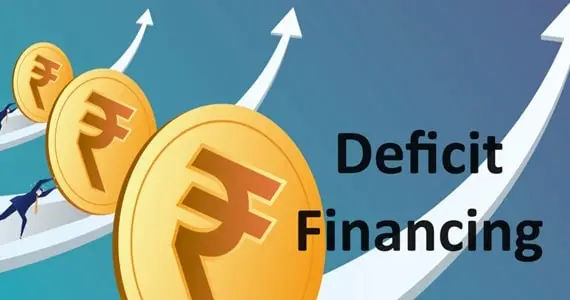Deficit financing is a huge talking point when it comes to justifying and criticizing a nation’s government’s actions. But what exactly is it? Well, that’s what today’s post is all about, where we will be over what deficit financing is, what are its prime benefits, and where governments go wrong with it. So yes, come with us as we explore the advantages and disadvantages of deficit financing. Alright, that’s enough of the intro here, let’s now look at the actual stuff, shall we?
What Exactly is Deficit Financing?
To put it in the simplest words possible, deficit financing occurs when governments spend more than they earn from sources like taxes. To cover such a gap, it is going to require borrowing through the sale of bonds, new creation of money by the central bank, or even the use of past savings. It allows the government an opportunity to be able to finance projects such as building schools or improving roads even in times when increased tax revenue is not yet available.

Advantages of Deficit Financing
1. Boosting the Economy
Deficit financing acts like a helpful nudge to energize the economy whenever it begins to slow down. The government can start the ball rolling when firms become skeptical about investing their funds by increasing their expenditure. It can be in the form of road construction, and better provision of public services, all of which may lead to increased numbers of jobs created and an increased demand for different types of products and services. More or less, this is what keeps the economic wheels moving and prevents the economy from collapsing down to the recession, making sure the jobs are there and businesses thrive.
2. Building the Future
Deficit financing allows the government an opportunity to be engaged in megaprojects, which would develop vital infrastructures like roads, bridges, and institutions of learning aka schools or colleges. These are actually the long-term investments of the country’s future and not capital projects only. Efficient roads, improved transportation, and improved schools are stepping stones for educating the leaders of tomorrow, we all can agree on that at least, right? All these steps are ultimately enhancing not only the living standards of the nation but also driving economic growth in the long run, despite very high initial costs.
3. Making the Most of Resources
Just imagine the hectares of unused land or all those buildings that are just sitting pretty. The deficit financing would help the government to harness these idle resources into activities that result in contributions to the economy. Eventually, though, this approach would open doors for new businesses or new employment, which will evidently strengthen economic growth.
4. Enhancing Social Welfare
Deficit financing remains very essential since it sustains or initializes programs that bear a direct impact on the public, for example, those to deal with health care, education, and social security. Even in financially constrained times, this financing method ensures these crucial services are funded. It is very important, especially during emergencies such as pandemics or natural disasters when the government has to act very fast. The financing of such programs aims at ensuring the provision of stability and support to the citizens by the government when in need.
5. Reducing Economic Disparity
The problem of economic inequality is dealt with By allocating government expenditures towards initiatives that support lower-income groups in areas such as job training programs or affordable housing. It is a strategy that helps people and enhances the economy by enlarging the pool of those people who can contribute to and receive benefits from economic activity.
Disadvantages of Deficit Financing
1. Pressure Regarding Inflation
Can you imagine if the government is spending from its own pocket through deficit financing and they are still able to push the prices up? Here’s how it works: If the production of goods and services does not match such expenditure, then everything gets pricier. What does it all mean for us, to you and me? Quite simply, the money that is in the hands of everybody is not stretching as far as it once did, but hitting hardest those people on fixed incomes or savings. The worst pinch we feel is called inflation. This squeezes our budget and makes living from day to day that much more difficult.
2. Debt Accumulation
Just imagine slapping every expense on your credit card and paying only the minimum every month. That expense just accumulates over time. That’s what happens when a government keeps borrowing to fund the budget. Over time, that pile of debt grows so huge it’s scary.
3. Impact on Interest Rates
When the government takes out a hefty loan, it might bump up interest rates. Why? Because suddenly, everyone’s scrambling for a piece of the loan pie. In turn, this means higher interest rates, and thus, borrowing gets more costly for all: from families dreaming of a new home to businesses aspiring to expand. This could slow down economic growth, as individual persons and businesses may think twice to take more debt and spend more.
4. Dependence on External Funding
Borrowing too much from external sources, like foreign countries or global banks, is a slippery slope. It will force the country to play according to the rules of the lender and cramp their style in making their own economic decisions. This can be a real drag on everyone’s future prospects and daily well-being.
5. Short-term Focus
Using deficit financing is somewhat like putting a Band-Aid on a large cut. It might stop bleeding at least for some time, but certainly not a cure. This kind of quick fix might fix this issue of the economy for a bit by ramping up spending, but without a concrete plan of how there should be continual growth and stability, this is just setting up for larger headaches down the line. It’s crucial for governments to look beyond the now and plan for a steady tomorrow.
Final Thoughts
That’s all there is for now. And by this point, you may be feeling a lot clearer in your head about whether or not deficit financing is a good thing. Sure, it can be used in a good way, but there definitely are some downsides to consider too, just like anything else in government policies, actions, or life in general.

